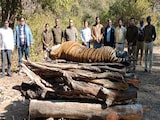- India refuses to open agriculture and dairy sectors to US in trade deal talks
- Dairy sector employs over 80 million and feeds more than 1.4 billion people in India
- India demands strict certification that imported milk is from cows not fed animal products
As India and the US are preparing to finalise an interim trade deal, agriculture and dairy prove to be sticky issues. India has drawn a line on opening these two sectors to the US as these may cause huge losses. The dairy sector feeds more than 1.4 billion people and employs over 80 million. Apart from this "non-veg milk" is causing contention.
India is asserting that there should be strict certification delineating that imported milk comes from cows that have not been fed animal-based products such as meat or blood. India has termed this as a "non-negotiable red line" because of religious and cultural sensitivities. Milk and ghee are used in religious rituals in India everyday.
"Imagine eating butter made from the milk of a cow that was fed meat and blood from another cow. India may never allow that," Ajay Srivastava of Global Trade Research Institute (GTRI), a New Delhi-based think tank, told PTI.
The US has termed India's demands as an "unnecessary trade barrier". A senior government source in an interview with India Today TV earlier in July said that, "There is no question of conceding on dairy. That's a red line".
"Cows are still allowed to eat feed that can include parts of pigs, fish, chicken, horses, even cats or dogs... And cattle can continue to consume pig and horse blood for protein, as well as tallow, a hard fat from rendered cattle parts, as a fattening source," The Seattle Times wrote. Other than that, there is poultry litter, chicken droppings, feathers and spilled feed that also be added, as that is cheap.
The dietary choices of most Indians are vegetarian, and consumption of dairy that has come from cows that have been fed animal by-products do not match the religious beliefs of Indians.
The US, which is a major dairy exporter, wants access to the Indian market, which is the world's largest milk producer and consumer. Agreeing to that would mean entry of cheaper US dairy products, which in turn would drive its domestic prices down and result in jeopardising the economic stability of farmers.
"The government needs to make sure we're not hit by cheap imports from other countries. If that happens, the whole industry will suffer, and so will farmers like us," Mahesh Sakunde, a farmer from Maharashtra told Reuters.
SBI has estimated the annual loss to be Rs 1.03 lakh crore if India opens its market to the US, ANI reported.
India's Department of Animal Husbandry and Dairying mandates veterinary certification for food imports, which ensures products are from animals that have not been fed bovine-related feed. The United States has criticised this at the World Trade Organisation.
The sticky points in the US-India trade deal involve both economical and cultural elements.















